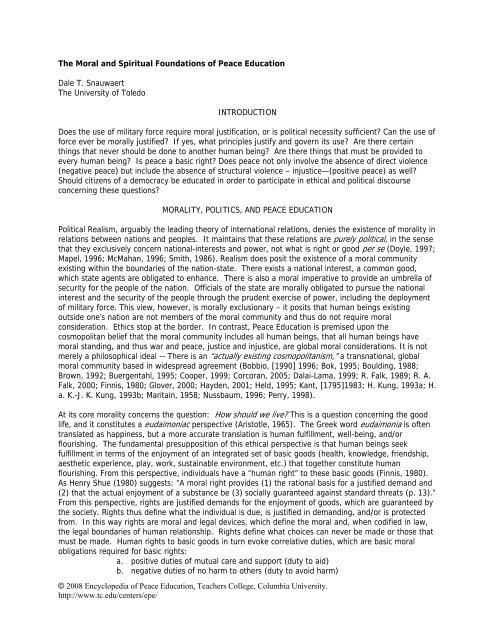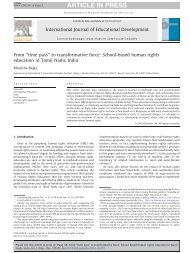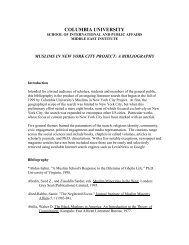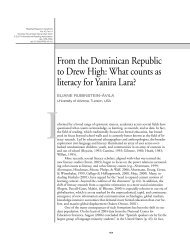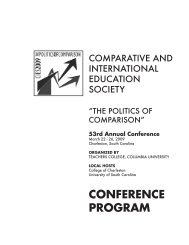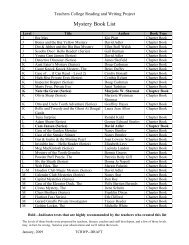The Moral and Spiritual Foundations of Peace Education - Teachers ...
The Moral and Spiritual Foundations of Peace Education - Teachers ...
The Moral and Spiritual Foundations of Peace Education - Teachers ...
Create successful ePaper yourself
Turn your PDF publications into a flip-book with our unique Google optimized e-Paper software.
<strong>The</strong> <strong>Moral</strong> <strong>and</strong> <strong>Spiritual</strong> <strong>Foundations</strong> <strong>of</strong> <strong>Peace</strong> <strong>Education</strong><br />
Dale T. Snauwaert<br />
<strong>The</strong> University <strong>of</strong> Toledo<br />
INTRODUCTION<br />
Does the use <strong>of</strong> military force require moral justification, or is political necessity sufficient? Can the use <strong>of</strong><br />
force ever be morally justified? If yes, what principles justify <strong>and</strong> govern its use? Are there certain<br />
things that never should be done to another human being? Are there things that must be provided to<br />
every human being? Is peace a basic right? Does peace not only involve the absence <strong>of</strong> direct violence<br />
(negative peace) but include the absence <strong>of</strong> structural violence – injustice—(positive peace) as well?<br />
Should citizens <strong>of</strong> a democracy be educated in order to participate in ethical <strong>and</strong> political discourse<br />
concerning these questions?<br />
MORALITY, POLITICS, AND PEACE EDUCATION<br />
Political Realism, arguably the leading theory <strong>of</strong> international relations, denies the existence <strong>of</strong> morality in<br />
relations between nations <strong>and</strong> peoples. It maintains that these relations are purely political, in the sense<br />
that they exclusively concern national-interests <strong>and</strong> power, not what is right or good per se (Doyle, 1997;<br />
Mapel, 1996; McMahan, 1996; Smith, 1986). Realism does posit the existence <strong>of</strong> a moral community<br />
existing within the boundaries <strong>of</strong> the nation-state. <strong>The</strong>re exists a national interest, a common good,<br />
which state agents are obligated to enhance. <strong>The</strong>re is also a moral imperative to provide an umbrella <strong>of</strong><br />
security for the people <strong>of</strong> the nation. Officials <strong>of</strong> the state are morally obligated to pursue the national<br />
interest <strong>and</strong> the security <strong>of</strong> the people through the prudent exercise <strong>of</strong> power, including the deployment<br />
<strong>of</strong> military force. This view, however, is morally exclusionary – it posits that human beings existing<br />
outside one’s nation are not members <strong>of</strong> the moral community <strong>and</strong> thus do not require moral<br />
consideration. Ethics stop at the border. In contrast, <strong>Peace</strong> <strong>Education</strong> is premised upon the<br />
cosmopolitan belief that the moral community includes all human beings, that all human beings have<br />
moral st<strong>and</strong>ing, <strong>and</strong> thus war <strong>and</strong> peace, justice <strong>and</strong> injustice, are global moral considerations. It is not<br />
merely a philosophical ideal -- <strong>The</strong>re is an “actually existing cosmopolitanism,” a transnational, global<br />
moral community based in widespread agreement (Bobbio, [1990] 1996; Bok, 1995; Boulding, 1988;<br />
Brown, 1992; Buergentahl, 1995; Cooper, 1999; Corcoran, 2005; Dalai-Lama, 1999; R. Falk, 1989; R. A.<br />
Falk, 2000; Finnis, 1980; Glover, 2000; Hayden, 2001; Held, 1995; Kant, [1795]1983; H. Kung, 1993a; H.<br />
a. K.-J. K. Kung, 1993b; Maritain, 1958; Nussbaum, 1996; Perry, 1998).<br />
At its core morality concerns the question: How should we live? This is a question concerning the good<br />
life, <strong>and</strong> it constitutes a eudaimoniac perspective (Aristotle, 1965). <strong>The</strong> Greek word eudaimonia is <strong>of</strong>ten<br />
translated as happiness, but a more accurate translation is human fulfillment, well-being, <strong>and</strong>/or<br />
flourishing. <strong>The</strong> fundamental presupposition <strong>of</strong> this ethical perspective is that human beings seek<br />
fulfillment in terms <strong>of</strong> the enjoyment <strong>of</strong> an integrated set <strong>of</strong> basic goods (health, knowledge, friendship,<br />
aesthetic experience, play, work, sustainable environment, etc.) that together constitute human<br />
flourishing. From this perspective, individuals have a “human right” to these basic goods (Finnis, 1980).<br />
As Henry Shue (1980) suggests: “A moral right provides (1) the rational basis for a justified dem<strong>and</strong> <strong>and</strong><br />
(2) that the actual enjoyment <strong>of</strong> a substance be (3) socially guaranteed against st<strong>and</strong>ard threats (p. 13).”<br />
From this perspective, rights are justified dem<strong>and</strong>s for the enjoyment <strong>of</strong> goods, which are guaranteed by<br />
the society. Rights thus define what the individual is due, is justified in dem<strong>and</strong>ing, <strong>and</strong>/or is protected<br />
from. In this way rights are moral <strong>and</strong> legal devices, which define the moral <strong>and</strong>, when codified in law,<br />
the legal boundaries <strong>of</strong> human relationship. Rights define what choices can never be made or those that<br />
must be made. Human rights to basic goods in turn evoke correlative duties, which are basic moral<br />
obligations required for basic rights:<br />
a. positive duties <strong>of</strong> mutual care <strong>and</strong> support (duty to aid)<br />
b. negative duties <strong>of</strong> no harm to others (duty to avoid harm)<br />
© 2008 Encyclopedia <strong>of</strong> <strong>Peace</strong> <strong>Education</strong>, <strong>Teachers</strong> College, Columbia University.<br />
http://www.tc.edu/centers/epe/
c. norms <strong>of</strong> rudimentary fairness (duty to protect) (Bok, 1995; Shue, 1980)<br />
<strong>The</strong> moral equation is not merely about what the individual is due but also, <strong>and</strong> fundamentally, it involves<br />
what individuals are obligated to provide or refrain from in relation to others. <strong>The</strong> duty to avoid harm<br />
entails restraint: the obligation to refrain from destructive action. <strong>The</strong> duty to protect entails the<br />
responsibility for establishment <strong>of</strong> norms, social practices, <strong>and</strong> institutions that enforce the duty to avoid<br />
deprivation. <strong>The</strong> duty to aid is positive in the sense that it is on obligation to provide for those in need.<br />
If individuals have a right to pursue happiness, to pursue human fulfillment, then this set <strong>of</strong> duties, <strong>and</strong><br />
their institutionalization, is morally imperative on the social level. <strong>The</strong>se correlative duties are necessary<br />
for the minimal level <strong>of</strong> social cooperation necessary for human flourishing.<br />
Does this imperative apply on the level <strong>of</strong> foreign relations? This question can be rephrased in terms <strong>of</strong><br />
moral duty. <strong>The</strong>re is an important distinction between “positional” duty <strong>and</strong> “natural” duty. Positional<br />
duty constitutes obligations that are entailed by a particular position or role in the society. Positional<br />
duties relate to special relationships connected to specific roles. Natural duty refers to obligations that<br />
are owed to all human beings regardless <strong>of</strong> position or specialized relationships. Natural duties speak to<br />
obligations that human beings possess <strong>and</strong> owe each other as human beings. Are the basic duties, the<br />
common values above, positional or natural? Do they apply to relations between societies <strong>and</strong> peoples?<br />
<strong>The</strong> claim that human beings have a right to pursue happiness, including rights to all goods necessary for<br />
human flourishing, is based upon the presupposition that human beings possess intrinsic value, that they<br />
are ends. It is an ethic that proclaims the sovereignty, not <strong>of</strong> any temporal governmental power, but that<br />
<strong>of</strong> human dignity. Human dignity is not defined by political borders but establishes a global,<br />
cosmopolitan moral community. <strong>The</strong> proposition here is that membership in the moral community is<br />
based upon the recognition <strong>of</strong> the intrinsic value <strong>of</strong> innate human characteristics <strong>and</strong> capacities. <strong>Peace</strong>,<br />
therefore, can be defined as a cosmopolitan moral order that secures human rights <strong>and</strong> duties necessary<br />
for human flourishing.<br />
When human rights are threatened or violated on a mass scale, such as aggressive war <strong>and</strong> genocide,<br />
the Just War tradition maintains that the aggrieved party has a right to protect itself <strong>and</strong> to restore a just<br />
peace <strong>and</strong> others, friends <strong>and</strong> allies, are justified in intervening to protect or restore that peace. This<br />
intervention can entail a justified use <strong>of</strong> force. <strong>The</strong> obligation to act for the protection <strong>of</strong> a just peace is<br />
founded upon a right <strong>of</strong> self-defense <strong>and</strong> an obligation to help others in need. In its efforts to defend a<br />
just peace, Just War <strong>The</strong>ory has developed two sets <strong>of</strong> principled considerations that define the<br />
st<strong>and</strong>ards for moral decision making concerning both the decision to go to war <strong>and</strong> the right conduct <strong>of</strong><br />
war: jus ad bellum <strong>and</strong> jus in bello respectively. In this moral tradition there exists a prima facie<br />
presumption against violence, <strong>and</strong> thus the use <strong>of</strong> force requires moral justification. <strong>The</strong> moral<br />
justifiability <strong>of</strong> using force is contingent upon meeting all <strong>of</strong> the following criteria: just cause, right<br />
authority, right intention, proportionality, reasonable hope <strong>of</strong> success, <strong>and</strong> last resort. Jus in bello<br />
pertains to the right conduct <strong>of</strong> force. From this perspective, the use <strong>of</strong> force must be proportional <strong>and</strong><br />
consistent with noncombatant immunity – the principles <strong>of</strong> proportionality <strong>and</strong> discrimination respectively.<br />
<strong>The</strong> use <strong>of</strong> force may be morally justified to restore a just peace, but it can never fall into total war, for<br />
then it contradicts its own justification, the protection <strong>of</strong> human dignity (Allen, [1991] 2001; Bishops,<br />
[1983] 1992; Boyle, 1996; Cady, 1989; Finnis, 1996; Ford, 1970; H<strong>of</strong>fman, 1981; Holmes, 1989, [1989]<br />
1992; Nardin, 1996; Ramsborth, 1996; Ramsey, 1961, [1968] 1983; Turner Johnson, 1981, 1999;<br />
Walzer, 1970, 1997; Wasserstrom, 1970; Yoder, 1984).<br />
<strong>Peace</strong>, as a cosmopolitan moral order, is in turn contingent upon the capacity <strong>of</strong> individual persons to<br />
respond to the inherent dignity, the intrinsic value <strong>of</strong> others. Principles <strong>of</strong> rights <strong>and</strong> duties are essential<br />
but they remain powerless without the internal moral resources that equip one to morally respond to<br />
others.<br />
<strong>The</strong>re are two basic moral sensibilities that form our moral capacity: “I can’t” <strong>and</strong> “I must” (Fromm,<br />
1947; Glover, 2000). “I can’t” constitutes the capacity to refrain from doing harm – a capacity <strong>of</strong><br />
restraint. It is grounded in the capacity <strong>of</strong> internal reflection <strong>and</strong> self-awareness <strong>of</strong> what is consistent<br />
2
with one’s own integrity (Arendt, 1971, 1992, 1994; Arendt & Kohn, 2003; Dalai-Lama, 1999; Hanh,<br />
1987). It is based upon the moral perspective that it is “better to suffer wrong than to do wrong.” In<br />
Plato’s Gorgias Socrates states metaphorically: “it would be better for me that my lyre or a chorus I<br />
direct were out <strong>of</strong> tune <strong>and</strong> loud with discord, <strong>and</strong> that most men should not agree with me <strong>and</strong><br />
contradict me, rather than that I, being one, should be out <strong>of</strong> tune with myself <strong>and</strong> contradict myself<br />
(482b-c).” If I harm others, then I will not be able to live with my self. <strong>The</strong> potential internal discord<br />
stops me. It is an internal, spiritual mechanism <strong>of</strong> restraint.<br />
“I must” constitutes the capacity to positively respond, with care <strong>and</strong> compassion, to the needs <strong>of</strong> others.<br />
This response requires the capacity to meet the other as a subject, as an end. It is based in the<br />
recognition <strong>of</strong> the intrinsic value <strong>of</strong> the other person (Buber, 1970). It also involves the awareness <strong>of</strong> the<br />
interdependence <strong>and</strong> interconnection between human beings. It also entails the capacity <strong>of</strong> equanimity,<br />
the ability to remain impartial while being able to take the perspective <strong>of</strong> the other (Dalai-Lama, 1999).<br />
CONCLUSION<br />
From this perspective, morality <strong>and</strong> thereby peace are structured in the overall quality <strong>of</strong> our hearts <strong>and</strong><br />
minds (Dalai-Lama, 1999). As Betty Reardon maintains, peace education should aim at the<br />
transformation <strong>of</strong> both the structures <strong>of</strong> society <strong>and</strong> the structures <strong>of</strong> consciousness (Reardon, 1988).<br />
<strong>The</strong>se points suggest that peace education has interrelated moral <strong>and</strong> spiritual foundation.<br />
REFERENCES & FURTHER READING<br />
Allen, J. L. ([1991] 2001). War: A primer for Christians. Dallas: First Maguire Center/Southern Methodist<br />
University Press.<br />
Arendt, H. (1971). <strong>The</strong> life <strong>of</strong> the mind (Vol. one volume edition). New York: Harcourt.<br />
Arendt, H. (1992). Lectures on Kant's political philosophy. In R. Beiner (Ed.), Hannah Arendt lectures on<br />
Kant's political philosophy (pp. 3-88). Chicago: <strong>The</strong> University <strong>of</strong> Chicago Press.<br />
Arendt, H. (1994). Eichmann in Jerusalem: A report on the banality <strong>of</strong> evil. New York: Penguin Books.<br />
Arendt, H., & Kohn, J. (2003). Responsibility <strong>and</strong> judgment (1st ed.). New York: Schocken Books.<br />
Aristotle. (1965). Nicomachean ethics (J. A. K. Thomson, Trans.). Baltimore: Penguin Books.<br />
Bishops, U. S. C. ([1983] 1992). <strong>The</strong> challenge <strong>of</strong> peace: God's promise <strong>and</strong> our response. In J. B.<br />
Elshtain (Ed.), Just war theory (pp. pp. 77-168). New York: New York University Press.<br />
Bobbio, N. ([1990] 1996). <strong>The</strong> age <strong>of</strong> rights. Cambridge, UK: Polity Press.<br />
Bok, S. (1995). Common values. Columbia: University <strong>of</strong> Missouri Press.<br />
Boulding, E. (1988). Building a global civic culture: <strong>Education</strong> for an interdependent world. New York:<br />
<strong>Teachers</strong> College Press.<br />
Boyle, J. (1996). Just war thinking in catholic natural law. In T. Nardin (Ed.), <strong>The</strong> ethics <strong>of</strong> war <strong>and</strong><br />
peace: Religious <strong>and</strong> secular perspectives (pp. 40-53). Princeton, NY: Princeton University Press.<br />
Brown, C. (1992). International relations theory: New normative approaches. New York: Columbia<br />
University Press.<br />
3
Buber, M. (1970). I <strong>and</strong> thou (W. Kaufman, Trans.). New York: Scribners.<br />
Buergentahl, T. (1995). International human rights. St. Paul, MN: West Publishing.<br />
Cady, D. L. (1989). From warism to pacifism: A moral continuum. Philadelphia: Temple University Press.<br />
Cooper, B. (Ed.). (1999). War crimes: <strong>The</strong> legacy <strong>of</strong> Nuremberg. New York: TV Books.<br />
Corcoran, P. B. (Ed.). (2005). <strong>The</strong> earth charter in action: Toward a sustainable world. Amsterdam: KIT<br />
Publishers, In cooperation with the Earth Charter Initiative, San Jose, Costa Rica.<br />
Dalai-Lama. (1999). Ethics for the new millennium. New York: Riverhead Books.<br />
Doyle, M. W. (1997). Ways <strong>of</strong> war <strong>and</strong> peace. New York: W.W. Norton.<br />
Falk, R. (1989). Revitalizing international law. Ames, Iowa: Iowa State University Press.<br />
Falk, R. A. (2000). Human rights horizons: <strong>The</strong> pursuit <strong>of</strong> justice in a globalizing world. New York:<br />
Routledge.<br />
Finnis, J. (1980). Natural law <strong>and</strong> natural rights. Oxford: Clarendon Press; Oxford University Press.<br />
Finnis, J. (1996). <strong>The</strong> ethics <strong>of</strong> war <strong>and</strong> peace in the catholic natural law tradition. In T. Nardin (Ed.), <strong>The</strong><br />
ethics <strong>of</strong> war <strong>and</strong> peace: Religious <strong>and</strong> secular perspectives (pp. 15-37). Princeton, NY: Princeton<br />
University Press.<br />
Ford, J. C. (1970). <strong>The</strong> morality <strong>of</strong> obliteration bombing. In R. A. Wasserstrom (Ed.), War <strong>and</strong> morality<br />
(pp. 15-41). Belmont, CA: Wadsworth Publishing Company.<br />
Fromm, E. (1947). Man for himself: An inquiry into the psychology <strong>of</strong> ethics. New York: Rinehart <strong>and</strong><br />
Company.<br />
Glover, J. (2000). Humanity: A moral history <strong>of</strong> the twentieth century. New Haven: Yale University Press.<br />
Hanh, T. N. (1987). Being peace. Berkeley, Calif.: Parallax Press.<br />
Hayden, P. (Ed.). (2001). <strong>The</strong> philosophy <strong>of</strong> human rights. St. Paul: Paragon House.<br />
Held, D. (1995). Democracy <strong>and</strong> the global order. Stanford, CA: Stanford University Press.<br />
H<strong>of</strong>fman, S. (1981). Duties beyond borders: On the limits <strong>and</strong> possibilities <strong>of</strong> ethical international politics.<br />
Syracuse, NY: Syracuse University Press.<br />
Holmes, R. L. (1989). On war <strong>and</strong> morality. Princeton, NJ: Princeton University Press.<br />
Holmes, R. L. ([1989] 1992). Can war be morally justified? <strong>The</strong> just war theory. In J. B. Elshtain (Ed.),<br />
Just war theory (pp. pp. 195-233). New York: New York University Press.<br />
Kant, I. ([1795]1983). Perpetual peace <strong>and</strong> other essays (T. Humphrey., Trans.). Cambridge: Hackett.<br />
Kung, H. (1993a). Global responsibility: In search <strong>of</strong> a new world ethic. New York: Continuum.<br />
4
Kung, H. a. K.-J. K. (Ed.). (1993b). A global ethic: <strong>The</strong> declaration <strong>of</strong> the parliament <strong>of</strong> the world's<br />
religions. New York: Continuum.<br />
Mapel, D. R. (1996). Realism <strong>and</strong> the ethics <strong>of</strong> war <strong>and</strong> peace. In T. Nardin (Ed.), <strong>The</strong> ethics <strong>of</strong> war <strong>and</strong><br />
peace: Religious <strong>and</strong> secular perspectives (pp. 54-77). Princeton: Princeton University Press.<br />
Maritain, J. (1958). <strong>The</strong> rights <strong>of</strong> man <strong>and</strong> natural law. London: Ge<strong>of</strong>frey Bles.<br />
McMahan, J. (1996). Realism, morality, <strong>and</strong> war. In T. Nardin (Ed.), <strong>The</strong> ethics <strong>of</strong> war <strong>and</strong> peace:<br />
Religious <strong>and</strong> secular perspectives (pp. 78-92). Princeton: Princeton University Press.<br />
Nardin, T. (Ed.). (1996). <strong>The</strong> ethics <strong>of</strong> war <strong>and</strong> peace: Religious <strong>and</strong> secular perspectives. Princeton, NJ:<br />
Princeton University Press.<br />
Nussbaum, M. (1996). For love <strong>of</strong> country: Debating the limits <strong>of</strong> patriotism. Boston: Beacon Press.<br />
Perry, M. J. (1998). <strong>The</strong> idea <strong>of</strong> rights: Four inquiries. New York: Oxford University Press.<br />
Ramsborth, O. a. W., Tom. (1996). Humanitarian intervention in contemporary conflict: A<br />
reconceptualization. Cambridge: Polity Press.<br />
Ramsey, P. (1961). War <strong>and</strong> the Christian conscience: How shall modern war be conducted justly?<br />
Durham, NC: Duke University Press.<br />
Ramsey, P. ([1968] 1983). <strong>The</strong> just war: Force <strong>and</strong> political responsibility. New York: University Press <strong>of</strong><br />
America.<br />
Reardon, B. (1988). Comprehensive peace education: Educating for global responsibility. New York:<br />
<strong>Teachers</strong> College Press.<br />
Shue, H. (1980). Basic rights: Subsistence, affluence, <strong>and</strong> U.S. Foreign policy. Princeton: Princeton<br />
University Press.<br />
Smith, M. J. (1986). Realist thought from Weber to Kissinger. Baton Rouge, LA: Louisiana State University<br />
Press.<br />
Turner Johnson, J. (1981). Just war tradition <strong>and</strong> the restraint <strong>of</strong> war: A moral <strong>and</strong> historical inquiry.<br />
Princeton: Princeton University Press.<br />
Turner Johnson, J. (1999). <strong>Moral</strong>ity <strong>and</strong> contemporary warfare. New Haven: Yale University Press.<br />
Walzer, M. (1970). <strong>Moral</strong> judgment in time <strong>of</strong> war. In R. A. Wasserstrom (Ed.), War <strong>and</strong> morality (pp. 54-<br />
62). Belmont, CA: Wadsworth Publishing Company.<br />
Walzer, M. (1997). Just <strong>and</strong> unjust wars: A moral argument with historical illustrations. New York: Basic<br />
Books.<br />
Wasserstrom, R. A. (1970). On the morality <strong>of</strong> war: A preliminary inquiry. In R. A. Wasserstrom (Ed.),<br />
War <strong>and</strong> morality (pp. 78-101). Belmont, CA: Wadsworth Publishing Company.<br />
Yoder, J. H. (1984). When war is unjust: Being honest in just-war thinking. Minneapolis, MN: Augsburg<br />
Publishing House.<br />
5


